 |
| Vol. 1 No. 12 | December 1999 |
U.S. President Bill Clinton achieved one of the top foreign policy priorities of his administration this month as Israeli Prime Minister Ehud Barak and Syrian Foreign Minister Farouk al-Shara met in Washington to resume peace negotiations. "For the first time in history, there is a chance of a comprehensive peace between Israel and Syria and indeed all its neighbors," said Clinton at a Rose Garden ceremony on December 15 with Barak and Shara at his side.
 |
| One small step toward peace? |
However, most analysts categorically reject Barak's implausible claim that Assad agreed to resume talks without an ironclad guarantee the Israel will return the Golan Heights. "Syria's 'red lines' are the same as they have been for 25 years," says Judith Kipper, director of the Middle East Forum at the Council on Foreign Relations in Washington.
The outcome of this latest phase of Israel-Syrian negotiations clearly depends upon whether the Israeli public will accept the loss of the Golan, which was annexed in the early 1980's. Specifically, Barak must surpass two hurdles: a Knesset vote for approval of the terms of an agreement with Syria and a national referendum.
Step I: Knesset Approval
 |
The defection of NRP and Yisrael B'Aliyah would reduce the strength of Barak's coalition government from 68 Knesset members to 59--two short of the 61 votes needed for approval. Although he can probably count on support for his peace plan from Arab and leftist MKs outside of his coalition, there are also likely to be a number of individual MK's that defect from other coalition parties. According to a poll published by the Israeli daily Yediot Aharonot on December 12, 53 MK's support a complete withdrawal from the Golan Heights in exchange for peace, 54 are opposed, and 13 are uncertain (including one who refused to answer).
Particularly crucial to Barak's success will be the position taken by the 17 MKs of the ultra-religious, predominantly Sephardic Shas party, who generally vote unanimously as a single bloc. The entire delegation abstained in the parliamentary vote authorizing the resumption of talks on December 13 and most are known to oppose a complete withdrawal. However, most have said they will vote in line with the position taken by Rabbi Ovadia Yosef, the party's spiritual leader. "They [Shas] are the gatekeepers for the peace process, and if they won't share the keys, there won't be a peace process," says Ari Shavit, a columnist for the Israeli daily Ha'aretz. Barak made headway in ensuring their support by approving the allocation of $120 million to ministries and educational institutions controlled by Shas earlier this month.
There is even a hint of dissension in the the secular leftist Shinui party. The head of Shinui, MK Yosef Lapid, has stated that he is not sure whether he will vote to support or oppose a peace deal which involves a withdrawal from the Golan.
Step II: National Referendum
The road to approval of territorial concessions in a national referendum is also strewn with many obstacles. First and foremost is a controversial bill recently introduced by the Likud which would require that a majority of all registered voters (rather than a majority of those who actually vote in the referendum) approve any future peace treaty with Syria. In effect, this bill would count everyone who fails to vote as an opponent of the accord. Proponents of the bill argue that it is based upon legal precedents elsewhere in the world--a so-called "special majority" is required in some countries to annul government decisions (the analogy being that approval of territorial concessions essentially annuls the Israeli government's annexation of the Golan Heights). Surprisingly, this bill has won the support of three parties in Barak's coalition: Shas, NRP and Yisrael B'Aliyah.
Even if this bill does not pass, Barak may still have considerable problems garnering a majority of the votes in a national referendum. According to a recent Gallup poll, 46% of adult Israelis support a peace treaty entailing a complete withdrawal from the Golan, 46% are opposed, and 8% are undecided.2 Another recent poll, conducted by Geocartographia, suggests that Barak may have difficulty inspiring trust in his handling of the negotiations: 65.2% of Israelis don't believe his claim that no territorial concessions to Syria were promised by his administration prior to the resumption of peace talks.3
 |
| Israeli demonstrators protest outside the Knesset |
Opposition to land concessions in the Golan Heights is not, however, restricted to the Israeli political right. Amos Keinan, a well-known leftist writer and novelist who has been a staunch proponent of a land-for-peace settlement with the Palestinians and a unilateral withdrawal from south Lebanon, wrote that he is "not willing to give the beautiful, thriving, and prosperous Golan Heights to a wretched tyrant" in a letter this month to Third Way leader Yehuda Harel.
Opposition to an Israeli pullout has emerged from another unlikely quarter: Approximately 2,000 members of the indigenous Arab Druze community are making arrangements to relocate to Israel rather than live once again under Syrian rule. Most expressed fear that they would be persecuted for cooperating with Israeli forces.4
The political left in Israel is heavily mobilized in support of a withdrawal--President Ezer Weizman has even said that he will resign if the Israeli public rejects a peace treaty with Syria in the upcoming referendum.
The swing voters, it is said, are recent immigrants from the Soviet Union. According to an editorial in the Israeli press this month, most immigrants are "influenced to no small extent by their past in the former Soviet Union, their opposition to totalitarian regimes wherever they are and by their tendency to view the transfer of land as a weakness."5 However, Soviet immigrants are also near the bottom of Israel's economic ladder and are therefore susceptible to Barak's promise that a peace treaty with Syria will create an economic boom (he has not specified how exactly this will happen).
Meanwhile, a second round of negotiations between Barak and Shara, scheduled to last for 10 days, is scheduled to open on January 3 in Shepherdstown, West Virginia (within a 20-minute helicopter ride from the White House). For Barak, the protocol of the talks is far more important than the substance--he will need at least a handshake from Shara in order to win over a skeptical Israeli public.
1 "Israel insists it made no concessions on the Golan to get Syria to talk again," JTA, 9 December 1999.
2 Ma'ariv, 10 December 1999.
3 Hatzofe, 16 December 1999.
4 "Druze leaders opting to remain in Israel," IsraelWire, 14 December 1999.
5 Ma'ariv, 22 December 1999.
� 1999 Middle East Intelligence Bulletin. All rights reserved.